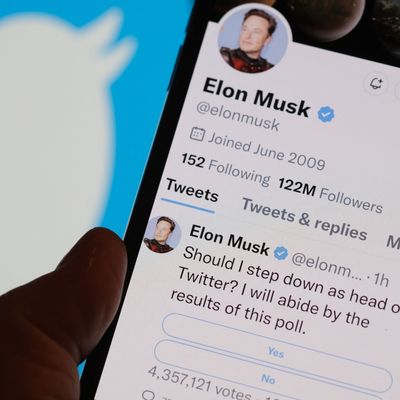
Following another rocky week at the helm of Twitter, Elon Musk put up a p asking the platform’s users if he should step down as head of the company, claiming “I will abide by the results of this poll.” By the time the poll closed early Monday morning, 57,5 percent of the more than 17.5 million respondents had voted “Yes.”
What that actually means is anybody’s guess at this point.
As the “Yes” votes continued to pile up, Musk tweeted through it, as is his wont. “As the saying goes, be careful what you wish, as you might get it,” he said in one tweet.
Replying to speculation that he has already chosen a successor and is using the poll as cover for wanting to hand over the reins, Musk claimed that “No one wants the job who can actually keep Twitter alive. There is no successor.”
“Those who want power are the ones who least deserve it,” he also said. He also went to the World Cup Final on Sunday in Qatar, which he watched with — of all people — former Trump White House boy genius Jared Kushner.
Again, what any of this actually means in the non-tweet world is far from clear. Will Musk actually step down? If so, when? How many of the votes are from real people? What would stepping down actually entail? Who would replace him and would they simply be a new public face for the same strategy? Will Musk declare bankruptcy for the company if this quasi-popularity contest goes against him? What do Musk’s investors think of this drama? Or is it all just another self-serving, attention-grabbing part of the show?
Musk posted the 12-hour poll after — though not necessarily as a response to — widespread backlash to a new policy Twitter announced Sunday banning users from sharing links or information about their accounts at a number of competing social-media platforms. Musk soon walked back the policy, apologized, and vowed that all major policy changes would be subject to a vote in the future.
That controversy followed the high-profile suspensions of multiple journalists’ Twitter accounts starting on Thursday night, for what Musk eventually claimed were violations of the company’s anti-doxxing rules. Some of those accounts were later restored, but more journalists were suspended for even less transparent reasons on Friday and Saturday: Insider columnist Linette Lopez, who has done a lot of critical reporting regarding Musk’s businesses over the years, and Washington Post tech reporter Taylor Lorenz, who Musk later claimed had been retroactively suspended for some past violation of the anti-doxxing rule.
As Intelligencer’s Kevin T. Dugan has noted, Musk’s Twitter adventure has already come at serious personal cost to the billionaire, and there’s speculation he may be setting himself up to lose Tesla.
This post has been updated.






























